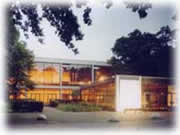The Berliner Festspiele (Germany)
- The Japan Foundation Awards
- William Gerard Beasley, C.B.E. Ikuo Hirayama
- The Japan Foundation Special Prizes
- Kosta Balabanov Naoyuki Miura

The Berliner Festspiele (Germany)
Since its inception in 1951, the Berliner Festspiele, the executive group for the carrying out of the Berlin Festival and the Berlin International Film Festival, has continued to introduce the high-quality arts of the world in all fields, especially music, drama, dance, literature, art, and films. Since 1965, the Festspiele has contributed to the introduction of the outstanding arts of Japan in Germany and the promotion of mutual understanding between Germany and Japan with a regular event focusing on Japan and other Japan-related activities every year.
Brief History
As the Cold War increased in intensity, stress was placed upon the development of art throughout the world through the Berlin Festival, which was held in West Berlin, where it served as a cultural showcase of the West. During the 1960s, the Berlin Festival developed into a first-class arts festival that continues to introduce the high-level arts of the world. Since 1965, a main theme is chosen for each year, under which a broad variety of cultural programs are carried out. In 1967, the Berliner Festspiele was established as the administrative organization of the Berlin Festival. And aside from the Japan-focused events that were organized in 1981, 1985, 1987, 1993, and 1999-2000, numerous Japanese films have also been introduced in the Berlin International Film Festival. In 2001, the Berliner Festspiele built its own theatre and exhibition hall to further its activities. It presents two annual events, the Berlin Festival (every September since 1951) and the Berlin International Film Festival (also every year since 1951). Since 1971, it has simultaneously carried out such programs as the International Forum of Young Film, the Berlin Festival of Contemporary Music (held every other year up to 2000, and to be held every March from 2002), the Berlin Theatre Meeting (of German-language performances, held every May since 1963), the JazzFest Berlin (every November since 1964), the Berlin Lectures (every year since 1987), as well as concours for youth in theatre, music, and literature.
Major Activities
- 1981
- "Japan in Berlin"
Carried out 13 Japan-related projects, including performances of Kabuki (Ennosuke Ichikawa); a concert of contemporary Japanese music (Tôru Takemitsu, Maki Ishii, Toshi Ichiyanagi); performances of the Ondekoza Japanese drum company; screenings of Japanese films. - 1985
- "Asia"
Performances of Kabuki (Ennosuke Ichikawa); a contemporary Japanese music concert (Tôru Takemitsu, Maki Ishii); a concert of Japanese jazz; a reading by Yasushi Inoue of his own works; an international poetry reading (Makoto Ôoka). - 1987
- "Japan Week in Berlin" (in celebration of the 750th anniversary of the organization of Berlin as an official city)
Carried out 18 Japan-related projects, including a performance of the Noh drama (Zeami-za); a poetry reading (Makoto Ôoka, Shuntarô Tanikawa); a Japanese film festival (a retrospective of films by Akira Kurosawa); a concert of Japanese contemporary music; and a symposium. - 1993
- "Japan as the main theme of the Berlin Festival"
Carried out 25 Japan-related projects, including an exhibition titled "Japan and Europe: 1543-1920"; a performance of Kabuki; a concert by the NHK Symphony Orchestra; a performance of Japanese classical dance; a performance of the Tokyo Ballet Company; a poetry reading of their own works by such writers as Masahiko Shimada, Taeko Kôno, and Yôko Tawada; and a retrospective of 100 Japanese films. - 1999-2000
- "Japan in Berlin 1999-2000"
Carried out more than 30 Japan-related projects, including a performance of Bunraku puppet theatre; a performance of the Noh drama (Umewaka Kennôkai); a poetry reading; lectures (Kenzaburo Ôe, Leona Esaki).
- What We Do Top
- Arts and Cultural Exchange [Culture]
- Japanese-Language Education Overseas [Language]
- Japanese-Language Education Overseas [Language] Top
- Learn Japanese-language
- Teach Japanese-language
- Take Japanese-Language Test
- Know about Japanese-language education abroad
- The Japanese-Language Institute, Urawa
- The Japanese-Language Institute, Kansai
- Japanese-Language Programs for Foreign Specified Skilled Worker Candidates
- Japanese Language Education for Japanese Children Resident Overseas and for the Descendants of Migrants
- Archives
- Japanese Studies and Global Partnerships [Dialogue]
- JF digital collection
- Other Programs / Programs to Commemorate Exchange Year
- Awards and Prizes
- Publications
